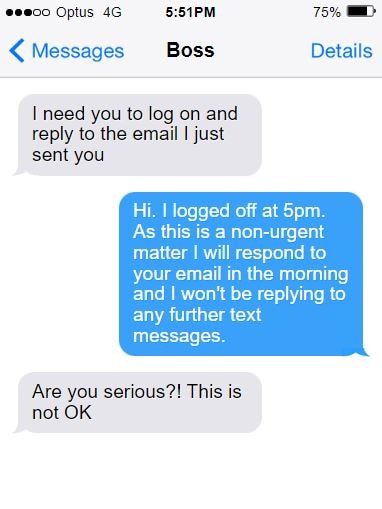Bosses warned over new Right to Disconnect law as ‘critical questions’ raised
Aussie bosses have been told to “be wary” in how they approach their employees’ right to disconnect, with legal experts pointing out a grim detail in the new laws.
At Work
Don't miss out on the headlines from At Work. Followed categories will be added to My News.
The new Right to Disconnect laws are in full force across the country and now bosses have been offered a fresh warning in light of the change.
The legislation kicked in on August 26, giving staff working at a business with 15 or more employees the right to refuse contact outside of their working hours, along with the right to refuse to monitor, read or respond to contact from an employer or third party.
These rules will also apply to small businesses from August 26, 2025.
The new rules apply within reason and several factors need to be considered before sending your boss to voicemail, but, ultimately, any calls, texts or emails deemed to be “unreasonable” contact can now officially be ignored.
While many workers have branded the new rules as a “positive change” that will help promote a healthier work-life balance, there are still some Aussies who aren’t impressed with the new legislation.
Some have gone as far as to brand the Right to Disconnect rules “ridiculous” and “such a Gen Z law”, while others have claimed those who take the law too literally will not be “doing themselves any favours”.
From this reaction, questions have also been raised for staff who exercise their right to disconnect about whether their employer’s perception of them may change or if it could have an impact on their career progression.


However, Aussie bosses who have taken issue with the change have been cautioned to proceed carefully, or risk facing the consequences.
Hicksons Lawyers senior associate Helen Sexton, who specialises in workplace relations, Employment and safety, told news.com.au that any impact on employees as a result of the new laws will depend on things like the employee’s profession, the nature of their role, workplace culture and leadership.
“Given the risk of adverse action claims and significant penalties for noncompliance, employers should be wary not to use the right to disconnect as an excuse to limit employees’ career progression,” Ms Sexton said.
Any disputes about an employee’s right to disconnect that can’t be resolved at a workplace level can be referred to the Fair Work Commission.
An employer may be subject to penalties of up to $18,780 for an individual or $93,900 for a body corporate if they are found to have violated the new laws.
“Employers are well advised to approach the new right proactively,” Ms Sexton said, adding that these changes are a “small step” towards rebalancing a system of working that has gradually shifted without much notice.
“Communicate upfront with employees, including in their job description, about working hours and organisational culture, and ensure that employees who are required to remain contactable outside work hours are appropriately compensated.”
While employers have been warned against ignoring the new laws, there are still concerns about how small to medium businesses will be impacted by the change.
Employment Hero head advisory of HR and EI Legal principal lawyer Simon Obee said these changes will likely prove to be costly for these businesses.
Mr Obee said SMEs (small-to-medium enterprise) in Australia are already feeling the effects of the increasing burden of red tape and legal compliance, with these new laws adding to the “already overflowing pool of regulations they need to comply with”.

“SMEs often work with tight budgets, making it costly to hire employment lawyers for compliance guidance. Yet, without this expertise, they risk making unintentional errors with significant consequences,” he said, noting that even minor breaches could “spell disaster” for smaller establishments.
Employment Hero chief executive Ben Thompson said that, while the Right to Disconnect law is well intended, it highlights how compliance is crippling small and medium Aussie businesses.
“This situation raises critical questions about the viability of starting and running a business in Australia,” Mr Thompson said.
“Beyond the debates and political manoeuvres, the real impact on employers and Australia’s position in the global employment market seems to be an afterthought.
“The ‘Right to Disconnect’ law, for instance, adds to the compliance burdens, despite its intentions, contributing to a landscape that seems increasingly hostile to business owners.”
Mr Thompson said whether you agree or disagree with the new regulations, there is no denying they place a heavy burden on SMEs.
“The complexity of ever-changing industrial laws in Australia, long recognised as some of the most intricate worldwide, has reached a new height, confusing SMEs and putting their spirit of entrepreneurship and innovation at significant risk,” he said.
Originally published as Bosses warned over new Right to Disconnect law as ‘critical questions’ raised





